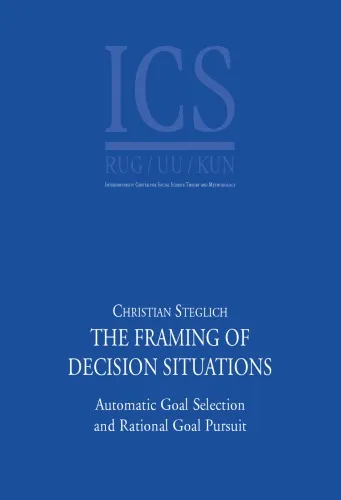The framing of decision situations : automatic goal selection and rational goal pursuit
4.6
Reviews from our users

You Can Ask your questions from this book's AI after Login
Each download or ask from book AI costs 2 points. To earn more free points, please visit the Points Guide Page and complete some valuable actions.Introduction
Welcome to the intellectual journey that is "The Framing of Decision Situations: Automatic Goal Selection and Rational Goal Pursuit". Co-authored by Christian Erich and Gerhard Steglich, this book delves into the complexities of decision-making, uncovering the profound interplay between the unconscious selection of goals and the pursuit of those goals with reasoned intent. Designed for both the academic reader and the curious mind, this work promises to illuminate the invisible frameworks that govern our choices, making it a key resource in the fields of psychology, behavioral economics, and cognitive science.
Detailed Summary of the Book
At its core, "The Framing of Decision Situations" explores how decisions are seldom made in isolation. Instead, they are intricately linked to the frames constructed by our psychological and social environments. Erich and Steglich take readers on a comprehensive exploration of the mental mechanisms that underlie goal selection. The authors make a compelling case for including "automatic goal selection" as a vital component of decision-making theories, arguing that many choices are made long before we are consciously aware of them.
The book unfolds in three parts. The first section provides a foundational understanding of decision frameworks, utilizing classical theories and contemporary research to lay the groundwork. The second part delves into automatic goal selection, explaining how automaticity interacts with conscious, rational thought processes. The authors illustrate this with vivid examples and empirical studies. Finally, the third section synthesizes these insights, offering a cohesive model for understanding decision-making as the intersection of automatic and rational processes. In doing so, the book challenges the binary perception of human thought as either automatic or rational, painting a richer picture of cognitive function.
Key Takeaways
- Automatic processes play a significant role in goal selection, which challenges the notion of humans as purely rational decision-makers.
- The interaction between automaticity and rational thought can be understood through a new integrative model that blends cognitive science and psychology.
- Decision-making frameworks are not universal; they can be influenced by cultural, societal, and individual factors which alter perceptions of rationality.
- Recognizing the ubiquity of these frameworks can lead to better outcomes in personal growth, business, policy-making, and therapy.
Famous Quotes from the Book
"The frames through which we view our choices are as critical as the choices themselves."
"In the dance of decision-making, the unconscious sets the rhythm while the conscious takes the lead."
Why This Book Matters
"The Framing of Decision Situations" stands out as an essential read for its ambitious scope and profound insight into human behavior. By illuminating the automatic processes that underlie decision-making, the book shifts fundamental perceptions about personal agency and rationality. It serves as a bridge between the realms of automaticity and conscious thought, areas often studied in isolation. For professionals in business, management, policy-making, and psychology, the strategies and insights offered by Erich and Steglich provide valuable tools for understanding and influencing decision-making processes. Moreover, in a world that increasingly values cognitive and behavioral insights, this book is poised to become a cornerstone text for anyone interested in the mechanisms of the human mind.
Free Direct Download
You Can Download this book after Login
Accessing books through legal platforms and public libraries not only supports the rights of authors and publishers but also contributes to the sustainability of reading culture. Before downloading, please take a moment to consider these options.
Find this book on other platforms:
WorldCat helps you find books in libraries worldwide.
See ratings, reviews, and discussions on Goodreads.
Find and buy rare or used books on AbeBooks.
1149
بازدید4.6
امتیاز50
نظر98%
رضایتReviews:
4.6
Based on 0 users review
"کیفیت چاپ عالی بود، خیلی راضیام"
Questions & Answers
Ask questions about this book or help others by answering
No questions yet. Be the first to ask!


